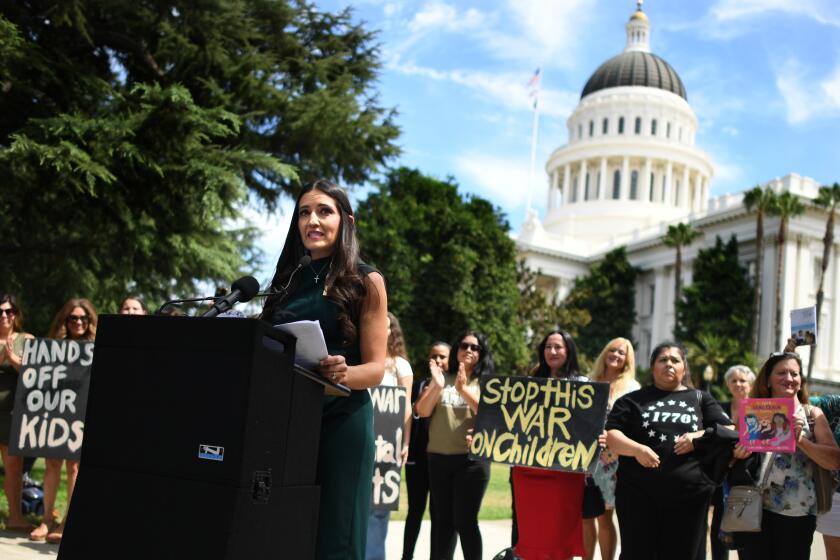California bill aims to end school gender notification policies — and protect teachers

- Share via
SACRAMENTO — As lawsuits play out in courts across the state over student privacy when it comes to gender identity, a bill introduced in the California Legislature on Wednesday aims to unilaterally end parental notification policies — and protect teachers caught in the fray.
Assemblymember Christopher M. Ward (D-San Diego) is carrying legislation that would shield teachers from “any retaliation” for supporting transgender student rights and would prohibit school policies that require “forced disclosure” of youth gender decisions to their families.
The bill is the latest attempt by Democrats to rein in Republican-backed school board policies, including those that seek to notify parents if their child changes their name or pronouns, or requests to use facilities or participate in programs that don’t match their gender on official records.
Such moves are being touted by conservatives nationwide in the name of parental rights. LGBTQ+ advocates have called the policies an attack on transgender children who don’t feel safe expressing themselves at home.
Ward called the measures “forced outing” policies, and said the new legislation is meant to reaffirm and clarify California’s stance on the issue, and would provide guidance to families of LGBTQ+ students to help them navigate the sensitive topic.
California courts will uphold, overturn or set ground rules for culture war battles in school districts over parent notification, book restrictions and even public records.
“Nothing ever was infringing on the parent-child relationship. Nothing is today, and nothing would be with this bill enacted,” Ward said ahead of a news conference in Sacramento on Wednesday. “But that’s not the job of teachers — to be the gender police.”
Since school boards in conservative pockets of California started engaging in culture wars over LGBTQ+ student rights last summer, a series of lawsuits have followed, and conflicting rulings have further complicated the debate over the constitutionality of minors’ right to privacy.
California Atty. Gen. Rob Bonta filed a lawsuit last year against the Chino school district, alleging its parental notification policy was discriminatory and violated civil rights and privacy laws.
A San Bernardino County Superior Court Judge ruled in a preliminary hearing that the policy was discriminatory because it specifically targeted transgender students. That led the Chino Valley Board of Education to revise the policy to expand it to all students seeking any changes to their records.
Bonta filed a new motion against the district last month seeking a final judgment to ensure that school board members do not attempt to reenact the policy, as they have continued to voice support for it.
A Temecula teachers union also sued school officials there over a similar policy. In that case, A Riverside County Superior Court judge allowed the policy for now. And in Chico, a parent lost a legal battle over allegations that the school district did not inform her about her child’s gender-identity issues.
“We do need statutory guidance,” Ward said. “The lack of it is contributing to confusion.”
Republicans lacking power in California are focusing on local school boards’ policies, setting up a fight with Gov. Gavin Newsom over ‘parental rights.’
Meanwhile, anti-transgender activists are backing a ballot measure that would not only require schools statewide to notify parents about student gender changes, but also ban some transgender healthcare for minors and enact new rules about school bathrooms and sports teams. The long-shot ballot measure has yet to acquire enough signatures to make it on the ballot in November.
If that measure passes, it could void the law that Ward is trying to pass.
Republicans were quick Wednesday to call the legislation an overreach by California Democrats into family matters.
The bill would “cut parents out of their kids’ education,” Assembly Minority Leader James Gallagher (R-Yuba City) said on social media.
“If something is going on with a child’s health or wellbeing, parents have a right to know,” he said.
It remains unclear what the law requires of teachers amid ongoing legal debates over parental notification and student privacy.
A Riverside County school district agreed to pay $360,000 last week to settle a lawsuit from a former teacher who said she was fired for refusing to comply with a requirement to use students’ preferred pronouns and in some cases withhold that information from parents. She said the policy violated her free speech and religious rights.
The focus of Wednesday’s Democratic-packed news conference in Sacramento, though, was the alternative possibility of teachers being forced to violate student privacy to alert their families about their gender expression.
“To have a blunt policy like a forced outing policy that requires a teacher to undermine that trust puts up a wall to be able to provide that education,” said Jeff Freitas, president of the California Federation of Teachers. “You tell me your pronoun, I’ll use it, we move forward, and I’ll teach.”
State Supt. of Public Instruction Tony Thurmond, who has announced plans to run for governor in 2026, stood alongside Ward and members of the California Legislative LGBTQ Caucus in support of the bill, and pointed to laws already on the books that protect transgender students, including gender-neutral bathroom requirements in schools.
“California students know who they are and who they are becoming. No one else should attempt to define for any of our students who they are,” Thurmond said. “This is a personal matter. This is a matter of safety. This is a matter of privacy.”
Times staff writer Howard Blume contributed to this report.
More to Read
Sign up for Essential California
The most important California stories and recommendations in your inbox every morning.
You may occasionally receive promotional content from the Los Angeles Times.













